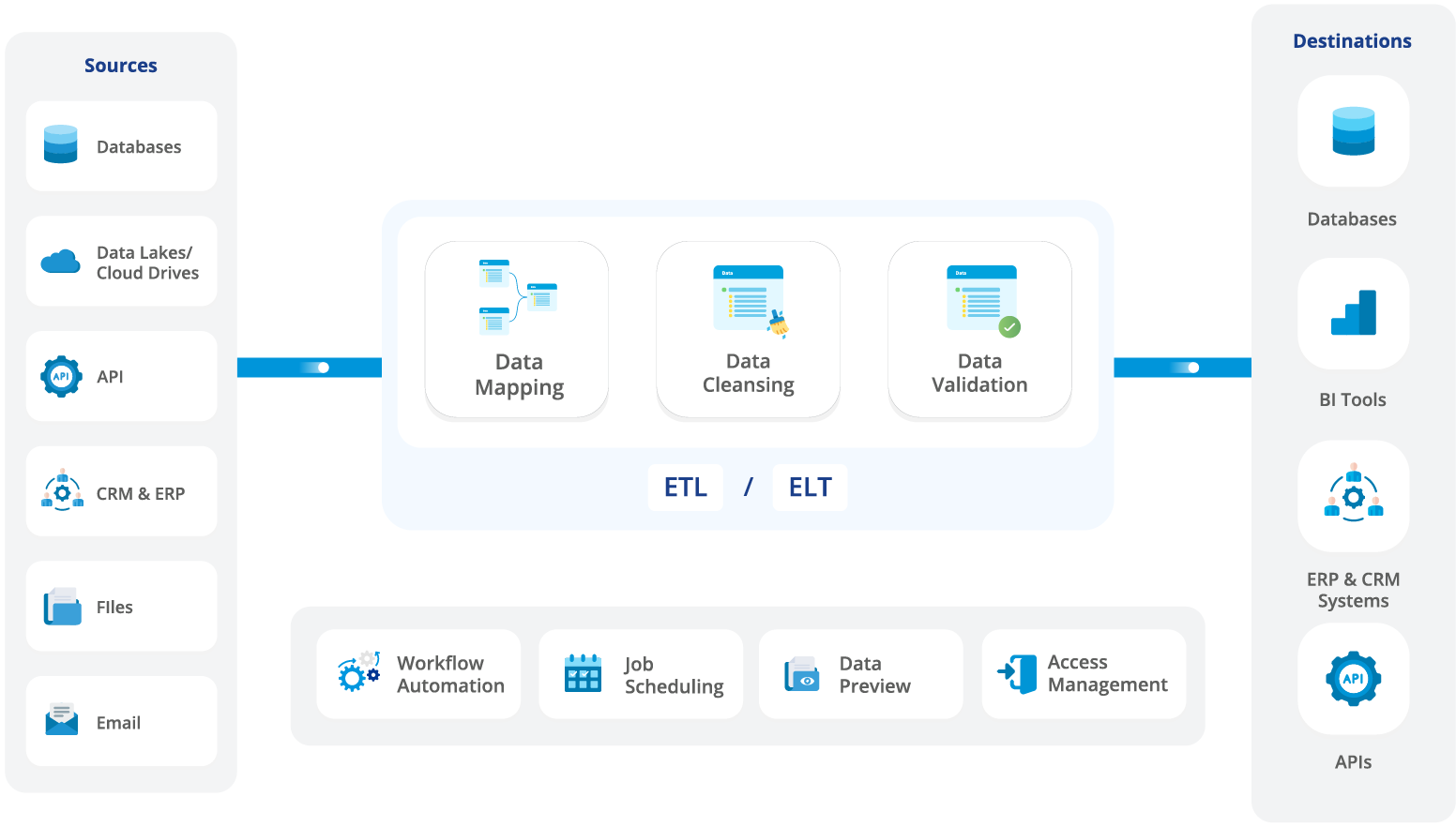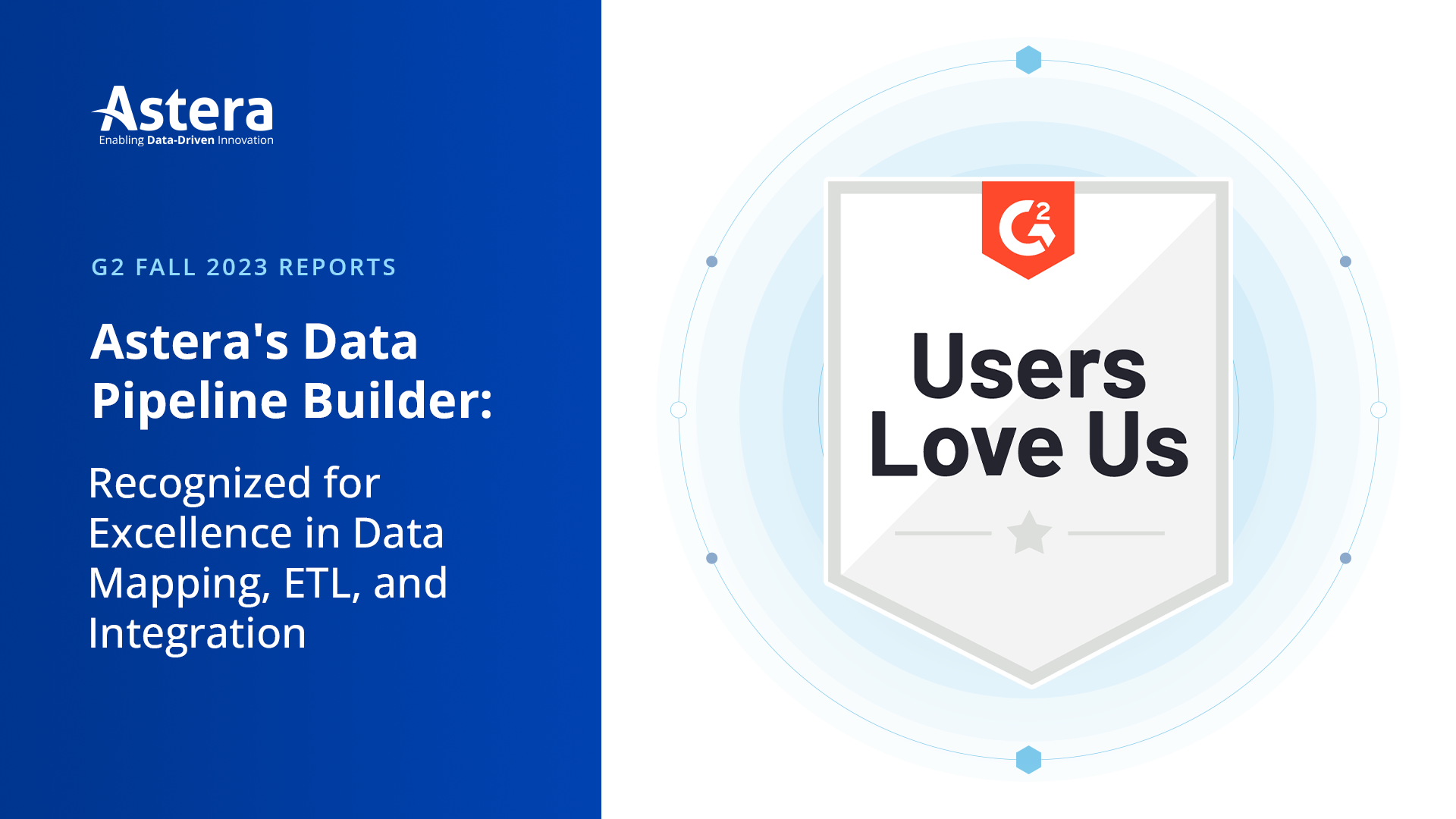
Top 6 MuleSoft Alternatives You Should Try in 2025
ETL platforms play a pivotal role in the seamless functioning of modern businesses, enabling the interconnection of various applications, data sources, and systems. MuleSoft has long been a prominent player in the integration platform arena, renowned for its powerful integration capabilities.
However, as the technological landscape continues to diversify in 2025, businesses are exploring MuleSoft alternatives that cater to their unique needs and requirements.
MuleSoft and Its Key Features
MuleSoft provides a unified data integration platform for connecting applications, data, and devices on-premises and in the cloud. Built on Java, its Anypoint Platform acts as a comprehensive solution for API management, design, monitoring, and analytics.
Some of MuleSoft’s key features include:
- API-Led Connectivity: MuleSoft facilitates the creation, management, and scaling of APIs, allowing organizations to improve connectivity with applications. Through its API-led approach, MuleSoft emphasizes modularity and reusability, simplifying the construction and upkeep of integrations.
- Anypoint Platform: Serving as a centralized hub, the Anypoint Platform allows for the design, construction, and management of APIs, integrations, and applications. Organizations can collaborate, streamline development processes, and gain insights into their integration landscape.
- Automated Data Mapping: Anypoint DataGraph by MuleSoft supports automatic data mapping, ensuring precise data synchronization.
- Error Handling and Monitoring: MuleSoft provides error handling and monitoring capabilities for quick issue identification and resolution. Real-time monitoring and alerting allow organizations to ensure the reliability and performance of their integrations.
Limitations: Why Should You Consider a MuleSoft Alternative?
Here are some potential reasons why businesses consider MuleSoft alternatives:
- Steep Learning Curve: MuleSoft has a steep learning curve, and its Anypoint Studio, which is used for designing Mule applications, may require training for developers who are new to the platform.
- Dependency on Skilled Developers: Requires an experienced MuleSoft developer with a Java background in the team.
- Limited Design Environment Support: Interaction with MuleSoft support directly from the design environment is currently unavailable.
- Customer support: MuleSoft offers different levels of customer support based on the subscription or licensing tiers, which means not all customers get 24/7 support and dedicated support engineers. Also, support hours and number of incidents supported are also dependent on the support tier purchased.
- Shortcomings in Complete Data Management: While MuleSoft excels in integration and connectivity, it falls short of being an end-to-end data management platform. Notably, MuleSoft lacks built-in capabilities for AI-powered data extraction and the direct construction of data warehouses.
MuleSoft Pricing
MuleSoft’s Anypoint Platform is an integration tool with a notably high cost, making it one of the more expensive options in the market. The pricing structure is linked to the volume of data being extracted, loaded, and transformed, resulting in monthly costs that are challenging to forecast.
The Anypoint platform from MuleSoft features three pricing tiers—gold, platinum, and titanium—each offering distinct processing capabilities, functionality levels, and corresponding pricing.
The cost associated with each tier is determined by the processing power required for data extraction and loading, increasing with growing API and integration requirements.

Top 6 MuleSoft Alternatives in 2025
1. Astera Data Pipeline Builder
Astera Data Pipeline Builder is an enterprise-grade unified end-to-end data management platform that enables organizations to build automated data pipelines easily in a no-code environment. With its extensive library of connectors, built-in data transformations, and data quality and security features, ADPB stands out as one of the best MuleSoft alternatives.
Key Features:
- Unified platform for AI-powered data extraction, preparation, integration, warehousing, edi mapping and processing, and API lifecycle management.
- Supports a broad range of connectors for popular databases, data warehouses, and file formats, facilitating seamless integration into the ETL/ELT process.
- Build API-based connectors for any integration apart from various native connectors.
- Extensive library of pre-built records and set-level transformations.
- Provides robust data profiling and quality features.
- Provides workflow automation, CDC, real-time data preview, and parallel processing
Pricing: Fair pricing structure with quote available on request. Avail a 14-day free trial to experience the solution firsthand.

2. Dell Boomi
Dell Boomi is a cloud-based integration platform encompassing application and data integration, API management, and master data management, among other data management capabilities. Its visual interface and pre-built connectors allow for rapid integration.
Key Features:
- Drag-and-drop user interface.
- Repository of pre-built integration processes, connectors, and reusable assets.
- Support for various integration patterns such as event-driven web services, batch, streaming, and ETL integration.
- Unified reporting console for streamlined monitoring.
- API-centric platform allowing the creation of low-code applications.
Pricing Structure: Choose from 5 pricing plans—Base, Professional, ProPlus, Enterprise, and Enterprise Plus—each tailored to cover specific features and different levels of customer support.
3. IBM App Connect
IBM App Connect is a cloud-based Integration Platform as a Service (iPaaS) tool that allows seamless connections among various software applications such as SaaS, ERPs, CRMs, HRMs, and data stores. It has AI capabilities that simplify the process of mapping and transforming data.
Additionally, IBM’s dashboard and integrated management tools allow users to oversee and control integrations, ensuring data integrity and security.
Key Features:
- No-code user interface.
- AI-driven connectors, and customizable templates.
- Many deployment options, including on-premises, in-cloud, and hybrid environments.
- Support for establishing automated CI/CD pipelines for continuous integration and delivery.
Pricing: Enterprise Integration Software pricing is available upon request.
4. SnapLogic
SnapLogic offers a low-code/no-code cloud-based integration platform that caters to both application and data integration needs. The platform provides a range of pre-built connectors (known as Snaps) and comprehensive end-to-end integration templates tailored for various common business processes.
Its feature set encompasses data automation and integration functions, allowing the efficient delivery of data to data lakes and cloud data warehouses through visual ETL and ELT processes.
Key Features:
- Data streaming architecture.
- AI-powered integration assistant for constructing workflows and pipelines.
- Equipped with pre-built Snaps for connecting to a wide array of common systems such as ERPs, CRMs, databases, IoT devices, among others, with the additional capability of creating custom Snaps through an SDK.
Pricing: The pricing details are available upon request.
Related: Learn about the best SnapLogic Alternatives for ETL/ELT
5. Jitterbit
Jitterbit’s Harmony is a low-code iPaaS solution designed to connect data, applications, and business processes, whether on-premises or in the cloud. Functioning as a cloud-native integration platform, it automates workflows and undertakes comprehensive API lifecycle management tasks while upholding enterprise-grade security and governance.
Key Features:
- Ready-made recipes, process templates, and connectors featuring reusable integration components
- Compatibility with hybrid environments, including SaaS, legacy systems, and on-premise setups
- Developer-friendly platform for API creation, publication, execution, and analysis
Pricing: Jitterbit Harmony offers Standard, Professional, and Enterprise pricing plans, tailored based on features, connectivity, API platform, and support and training.
6. Informatica
Informatica Integration Cloud offers a comprehensive suite of integration solutions, including data integration, application integration, and API management. With its user-friendly interface and extensive connectivity options, Informatica poses a strong alternative to MuleSoft.
Informatica supports connectivity to a broad range of data sources and targets, including databases (both relational and non-relational), applications, cloud platforms, and more. This enables organizations to integrate data from diverse sources and formats.
Key Features:
-
- Data transformation, allowing users to cleanse, enrich, and transform data during the integration process.
- Workflow management system
- Metadata Management for data lineage, and impact analysis
- Data profiling, cleansing, and standardization capabilities.
Pricing: Consumption-based pricing. Quote available upon request
Related: Learn about the best Informatica Alternatives for ETL/ELT
Why is Astera the Best MuleSoft Alternative?

Astera Data Pipeline Builder stands out as a superior alternative to MuleSoft due to its distinct flexibility, ease of use, and cost-effectiveness advantages.
As an AI-powered, cloud-based platform, Astera Data Pipeline Builder allows users to consolidate all aspects of their data workflows in one place, enjoy faster data preparation with cloud-based data prep, and set up data pipelines with varying latencies as needed.
The tool’s intuitive, user-friendly interface enables organizations to streamline their integration processes without the need for extensive technical expertise. Its agile and adaptable architecture enables seamless integration with various systems and applications, facilitating quicker implementation and reducing time-to-market.
While MuleSoft employs a tiered customer support model, wherein different plans dictate the level of assistance users receive, Astera is known for its award-winning customer support.
MuleSoft’s approach may limit accessibility for users on lower-tier plans, potentially impacting the quality and speed of support they receive. On the other hand, Asters offers exceptional customer support and assistance through the following:
- A ticket system
- Responsive email support
- Live chat for real-time resolutions
- Prompt phone support
- Comprehensive documentation
Astera also has its Data Academy for training and a collaborative community forum. This diverse range of support channels ensures users have efficient access to help across different needs and preferences.
So, what are you waiting for? Try Astera Data Pipeline Builder today to extract, transform, secure, streamline, and synchronize data effortlessly. Sign up for a demo or a 14-day free trial now!
 Astera AI Agent Builder - First Look Coming Soon!
Astera AI Agent Builder - First Look Coming Soon!


